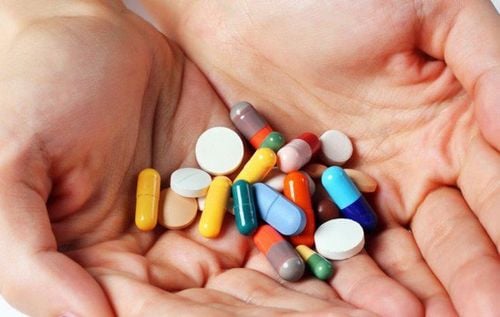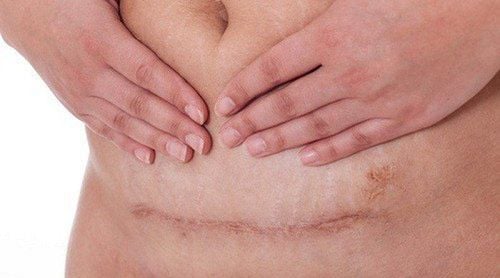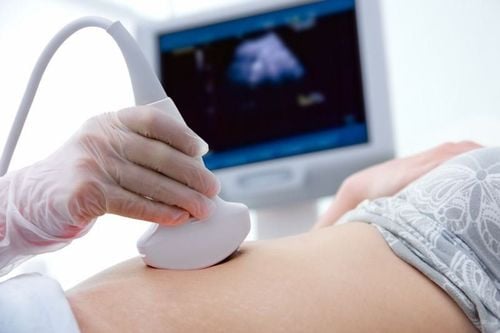This is an automatically translated article.
Drinking alcohol during pregnancy can cause alcohol-related birth defects. Alcohol slows the baby's brain development at birth, disrupting physical, behavioral and learning problems. The most serious type is fetal alcohol syndrome.1. What is Fetal Alcohol Syndrome?
Fetal alcohol syndrome is a condition in children that is acquired by the mother drinking alcohol during pregnancy. Fetal alcohol syndrome causes brain damage and growth problems in the unborn baby.In fact, no amount of alcohol is considered safe during pregnancy. If the mother drinks alcohol during pregnancy, it puts the baby at risk of fetal alcohol syndrome.
If you suspect that your baby has fetal alcohol syndrome, talk to your doctor as soon as possible. Early diagnosis can help children reduce learning difficulties and behavior problems later in life.
2. Alcohol-related birth defects symptoms

Hội chứng rượu bào thai là một tình trạng ở trẻ em mắc phải do người mẹ uống rượu trong khi mang thai
Physical Defects Physical disabilities may include:
Facial features such as small eyes, thin upper lip, short, upturned nose, flat skin between nose and upper lip (neutral unknown unknown) ) Deformed joints, limbs and fingers Slow physical growth before and after birth Difficulty seeing or hearing Small head circumference and brain size Heart defects and problems with kidneys and bones Disorder problems alcohol-related neurodevelopment Problems with the brain and central nervous system can occur such as:
Poor coordination or balance Intellectual disability, learning disorders and developmental delays Poor memory Trouble trouble with attention and information processing Difficulty with reasoning and problem solving Difficulty determining the consequences of choices Poor judgment skills Panic or hyperactive mood Rapidly changing Problems social and behavioral problems Functioning and interacting with others may include:
Difficulty at school Trouble with people around Poor social skills Trouble trouble adapting to change or transitioning from one task to another Problems with impulse control and behavior Bad concept of time Difficulty planning or working toward a goal If you're pregnant and can't stop drinking, see and talk to your obstetrician, primary care doctor or mental health professional for help.
3. Causes of Fetal Alcohol Syndrome
The main cause of fetal alcohol syndrome is the mother's alcohol consumption during pregnancy.Alcohol enters the mother's bloodstream and reaches the developing fetus by crossing the placenta. Alcohol concentration in the fetus is higher than in the mother's body because the fetal alcohol metabolism is slower than that of the fetus. of adults The process of breaking down alcohol in the fetus's body is not the same as in adults. A large amount of alcohol that builds up in the fetal body can interfere with the optimal supply of oxygen and nutrition to the developing baby. Prenatal alcohol exposure can harm the development of tissues and organs and cause permanent brain damage in the baby. Thus, the more alcohol a pregnant woman drinks during pregnancy, the greater the risk to the fetus. However, any amount of alcohol puts your baby at risk, because the baby's brain, heart, and blood vessels begin to develop in the early weeks of pregnancy, before you even know you're pregnant.
Drinking alcohol during the first trimester of pregnancy causes damage to the unborn baby's face, heart and other organs, including bones and central nervous system. That's when the fetal parts are in the prime stage of development.
The more alcohol you drink during pregnancy, the greater the risk of problems in the baby. You can put your baby at risk even before you realize you're pregnant. Therefore, pregnant women should pay attention not to drink alcohol while pregnant or planning to become pregnant.
4. Treatment of Fetal Alcohol Syndrome

Thuốc không thể điều trị dứt khoát hội chứng rượu bào thai nhưng có thể giúp cải thiện các triệu chứng của hội chứng này
At home Parents' care and support is the best condition to help children with fetal alcohol syndrome develop. Therefore, children need to live in a harmonious and happy family. These children can still do simple everyday tasks well and should be rewarded for good deeds.
Children with fetal alcohol syndrome are very sensitive and prone to violence, so families need to avoid conflicts and discord in the family to avoid consequences later.
Medications There are a number of medications that can help improve symptoms such as:
Antidepressants to treat depression and help with negative behavior Sedatives to treat anxiety and ease agitation Anti-anxiety drugs to treat anxiety Counseling and psychotherapy Children with fetal alcohol syndrome need support and training in social skills such as: the ability to communicate with peers, skills self-control skills, understanding the causes - the results of their behavior... Currently, there are many courses and centers to support children in this category on social skills as well as tutors in literature, Mathematics to help children overcome learning difficulties at school
In addition, alternative treatments such as massage, acupuncture, exercise or yoga are available.
5. Prevention of Fetal Alcohol Syndrome

Ngừng uống rượu hẳn khi mang thai để phòng ngừa hội chứng rượu bào thai
Limit and preferably stop drinking alcohol altogether if you are pregnant. If you haven't stopped drinking, stop as soon as you know you're pregnant. It's never too late to stop drinking during pregnancy but the sooner you stop, the better for your baby. Continue to avoid alcohol use throughout your pregnancy. Fetal alcohol syndrome is completely preventable in babies whose mothers did not drink during pregnancy. Consider giving up alcohol during your childbearing years if you're sexually active and you've had unprotected sex. If you're an alcoholic, get help from your doctor before you get pregnant. Get help from professionals to determine your level of alcohol dependence and to develop a treatment plan.
If you have unusual symptoms, you should be examined and consulted with a specialist.
Please dial HOTLINE for more information or register for an appointment HERE. Download MyVinmec app to make appointments faster and to manage your bookings easily.
Reference source: Mayoclinic.org.













